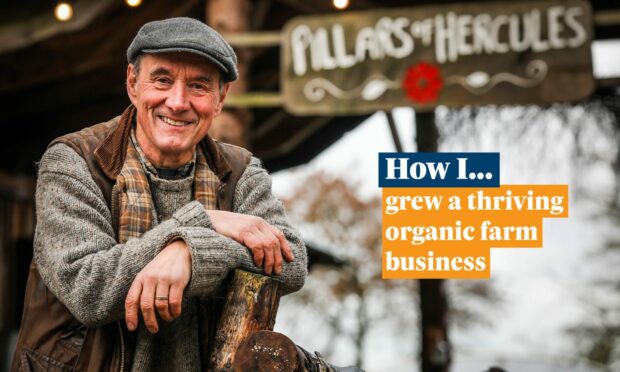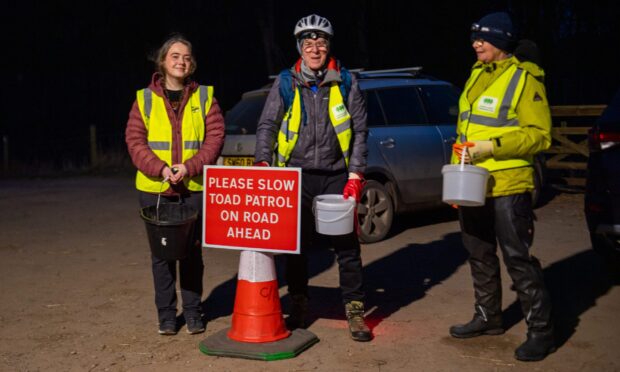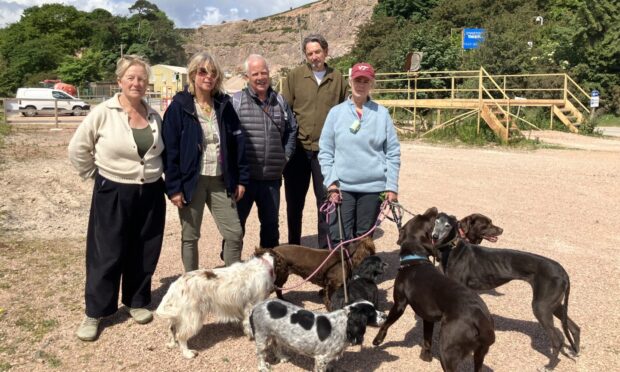It’s nearly 40 years since Bruce Bennett set up Pillars of Hercules in Fife and the organic farm is thriving.
What started as a small operation with a wee shed and an honesty box in the 1980s now supports 35 staff and includes a bustling shop and cafe.
But how does an organic farm weather climate change, a pandemic and a cost of living crisis?
We met Bruce at the farm to find out more.
‘Busier than ever’
Cardiff-born Bruce, 65, moved to the farm near Falkland in 1983. He says the farm continues to do well thanks to ‘”good, loyal customers”.
“We’re fairly resilient here because we’ve got a good local customer base and we’re very well established,” says Bruce.
“We seem to be busier than ever.”
During the pandemic, demand for vegetable box deliveries soared.
Before covid hit, the Pillars van was dropping off around 80 veg boxes a week. Deliveries peaked at 300 a week and are now sitting at around 220.
Bruce has now teamed up with Glenrothes Foodbank to donate unwanted veg boxes to those in need of fresh produce.
If a customer goes on holiday, they are given the option of donating their box rather than cancelling for the time they are away and getting a refund.
“They usually pick up half a dozen boxes every week.
“They’re really popular because a lot of contributions to the food bank are dried goods. To actually get fresh vegetables is a good thing for them.”
Offering an alternative to supermarket shopping
Bruce says he has “always tried not to be preachy” about organics.
“A lot of our customers are just as interested in getting good value and choice, and a personal service.”
However, he says supermarkets can discourage people form buying organic if it just isn’t selling.
“Supermarkets will keep a much closer eye on what’s selling and what isn’t selling.
“They will very readily drop organic lines if they’re not selling very well and promote the budget lines.
“That then affects people’s purchasing. If organic isn’t displayed as well or promoted it becomes self-fulfilling.”
You also won’t find any automated tills at Pillars, and Bruce has no plans to add any.
And there is much less plastic packaging. Bruce says selecting your own loose fruit and vegetables can be more cost-effective and reduce food waste.
“It’s less waste if people just pick what they want rather than take a whole bag.
“It’s better for people to come and buy a small amount regularly. And it’s fresher.”
Pillars reaches 40th milestone
Having worked on an organic farm in Wales and studied agricultural botany before moving to Scotland, Bruce spent time at an organic farm near Edinburgh and then settled in Fife.
He has built the Pillars site gradually over the years and next year will be its 40th anniversary.
You can buy your vegetables there, refill your washing up liquid, eat in the cafe, camp in the grounds or rent the holiday bothy on site. The most recent addition was an office and a treatment room.
But how does a farm weather climate change?
While the changing climate means more spells of drought and heavier rain, he adds: “They are not things that we can’t cope with. You just check the weather forecast and work with the weather you’re given.”
However, he says the UK may have to think about its food security as Mediterranean countries suffer water shortages.
“I feel it’s going to be quite difficult for them to carry own growing. We rely an awful lot on imported food from Spain in this country.
“It’s going to be problematic for people to even live in these places, let alone farm.
“That’s going to create more pressure on us trying to grow food in this country.”














Conversation